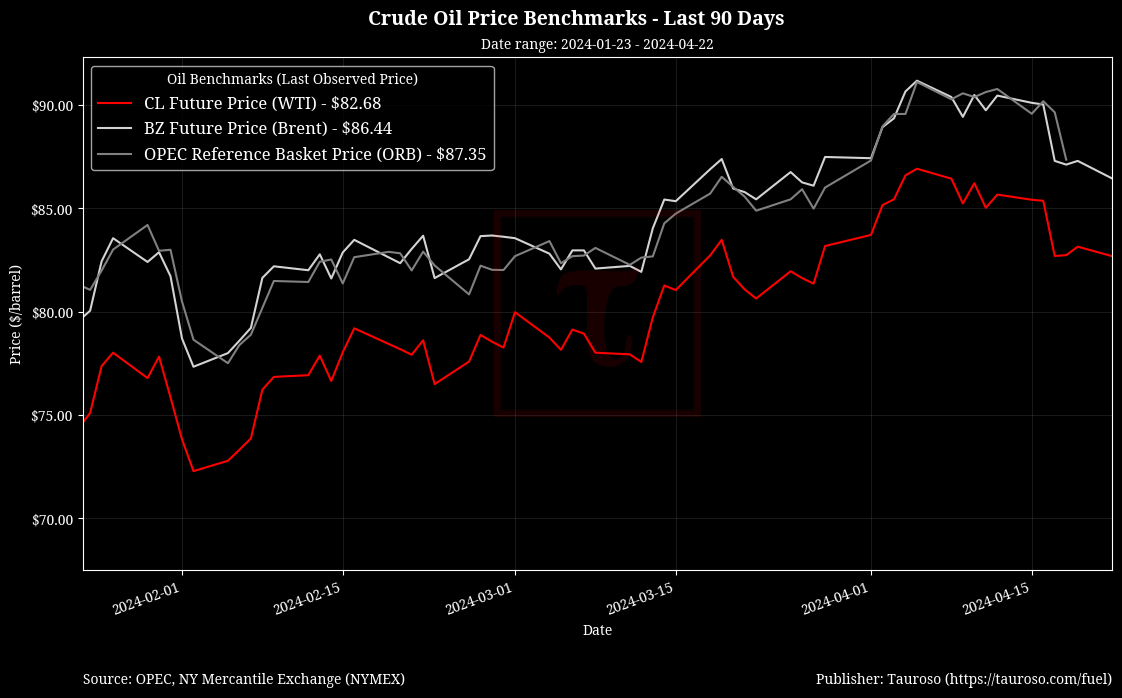What to expect
Given recent events with regards to wars and petroleum-derived fuel products, we expect crude oil markets to remain relatively stable and perhaps witness some small price relief in the US.
Crude oil in the US started trading for the week at $83 per barrel and since the early hours has seen a small fall toward $82 per barrel.
Highlights
- Iran-Isreal War: While markets have mostly shurgged off the concerns of a broader regional escalation, this drove volatilility of oil benchmarks last week. For now, situation is calm but what is clear is Iran and Israel and brought their shadow war into the light. A noteworthy point to continue monitoring the situation and its impact on crude oil prices.
"The real risk of this is that the Strait of Hormuz closes down or consolidates at a point where we can't get crude through there because 20% of the world's supply passes through there, so that is the big risk. It's not a risk of Iran is not going to supply anything or oil is not going to still be pumped — it's the delivery. So that's number one. Number two, where do we go from here? I know people are pegging $100 [per barrel], I think that's just an easy number... and what we have to keep in mind is when the start of the conflict between Russia and Ukraine began, we saw oil prices spike all the way to $125, I don't see that happening." - Prosper Trading Academy CEO Scott Bauer
- EPA allows E15 gasoline sales during summer: US EPA again allows higher-ethanol blend (E15) sales over the summer to provide needed relief for rising fuel prices in the US. Gasoline with 10% ethanol (E10) is currently sold nationwide, but the higher blend (E15) has been prohibited in the summer because of concerns it could worsen smog during warm weather.
"With gas prices on the rise again and geopolitical conflict roiling global energy markets, we applaud President Biden and EPA Administrator Michael Regan for taking decisive action to combat potential fuel shortages and keep a lid on gas prices this summer," - Renewable Fuels Association President and chief executive Geoff Cooper
- US East Coast Switches to Summer Gasoline Blend: After the majority of US has swtiched to the more expensive summer gasoline blend, the US coast makes the switch sending wholesale prices upwards.
"This week, New York, New Jersey, Pennsylvania, and other Northeastern states switched to a more expensive summer blend of gasoline, sending wholesale prices $0.30 to $0.32 per gallon higher" - Tom Kloza, global head of energy analysis at OPIS.
Crude Oil Benchmarks

References
- https://finance.yahoo.com/quote/CL%3DF
- https://finance.yahoo.com/quote/RB=F/
- https://finance.yahoo.com/news/gas-prices-why-one-us-region-will-see-stiff-increases-this-week-142300853.html
- https://finance.yahoo.com/video/oil-analyst-israel-iran-escalations-150546737.html
- https://finance.yahoo.com/news/us-epa-allows-temporary-expansion-154100012.html
- https://finance.yahoo.com/news/biden-epa-allows-summer-sales-150518057.htmlhttps://finance.yahoo.com/news/epa-again-allowing-summer-sales-193101111.html
